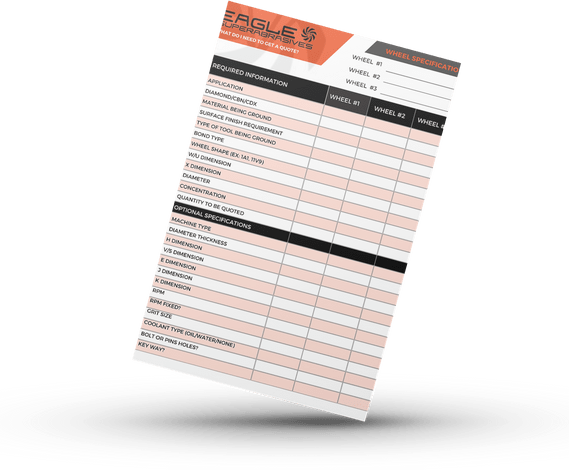When searching for a grinding wheel solution for your business, you’ll want to research every aspect of your investment – including price.
Pricing
Every day, we get customers who reach out to us to quote the price of a superabrasive grinding wheel. They may be looking into grinding ceramics for a small project, or require multiple wheels for larger projects in industries like aerospace, medical, and automotive. The bottom line is that they are looking for the cost of a diamond or CBN grinding wheel. If you’re just starting your research, you may be overwhelmed by the many intricacies involved in choosing the right superabrasive grinding wheel.
Price influencers consider factors like wheel bond, size, grit, and more. To assure you get the right type of wheel, consider the following questions a manufacturer may ask. You will need to provide wheel specifications (bond type, measurements, etc..) as well as information concerning your expectations.
Check out our free, printable Quote Comparison Tool so you’ll know exactly what to ask, and compare manufacturers side-by-side.
Once you’ve answered the questions in the Quote Comparison Tool worksheet, you may be wondering how your responses will affect the overall cost of your next grinding wheel. When evaluating price, some of these factors will be obvious while others are sometimes unexpected.
- Diameter of the wheel – The larger the wheel, the more costly.
- Thickness of the abrasive section – A thicker wheel contains more abrasive, making it more expensive.
- Depth of the abrasive section – As with thickness, the greater the depth of the abrasive section, the more a wheel will cost. Increased depth results in more material being used.
- Quantities – Most manufacturers use the “buy more, save more” model. The more abrasive and resin that can be mixed in one batch, the more cores that can be made at one time all affect the final cost. A larger quantity of one specific wheel typically decreases the cost of labor and materials.
- Concentration of the abrasive -A higher concentration C100 or C125 will increase the cost of the wheel; but for some applications C125 is necessary to ensure wheel performance.
Concentration refers to the number of Carats / cubic centimeter. - Wheel bond – Some bonds are more expensive than others. The more costly bonds include metal bonds, poly bonds, hybrid bonds, and vit bonds.
- Grit size - Fine grits (400 and over) are priced higher.
- Tight Tolerances – Price will increase if the application or customer requires extremely tight tolerances.
- Core Material – The material of the core can affect the pricing in two ways:
- Bakelite is the cheapest and the lightest so it saves on freight.
- Steel is more expensive and the heaviest, therefore increasing shipping costs
As you can see, the cost of a superabrasive wheel can vary greatly depending on type and application. The above points will hopefully aid you in assessing the “total cost” of both pre-stocked and custom grinding wheels. Remember that your investment in a grinding wheel doesn’t only include the wheel itself; it also includes the value your wheel provides over time.
When you use the right type of wheel, a larger initial investment will typically pay for itself. As you approach manufacturers, make sure you are prepared with this useful Quote Comparison Tool so that you can make the most informed decision possible.
If Eagle’s solutions appear to meet your grinding needs, know that our expert Application Engineers will walk you through the process, answering any questions you may have. We provide free grinding wheel quotes directly from our engineers.
We believe in a no-pressure environment to provide you with the education you need to guide you in the direction of the best grinding wheel solution.
contáctenos para una cotización gratis
o llámenos al 33 31255419 – 33 36315374

